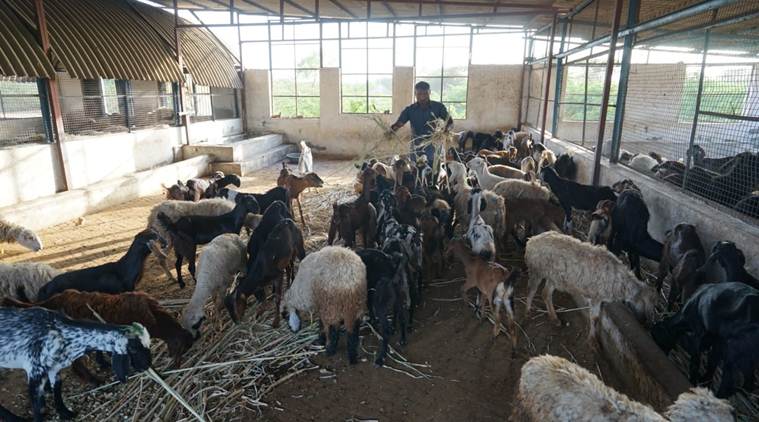 The curbs on transport of livestock from Rajasthan and Madhya Pradesh, as well as the ongoing ban on animal markets and large gatherings, due to the Covid-19 pandemic has meant that local animal farmers are sought after. (Express File Photo)
The curbs on transport of livestock from Rajasthan and Madhya Pradesh, as well as the ongoing ban on animal markets and large gatherings, due to the Covid-19 pandemic has meant that local animal farmers are sought after. (Express File Photo)
In a huge pen, goats of all breeds and sizes are paraded in a way they may be captured on camera. Ashfak Noorani, a goat trader, gives a running commentary on the goats that come before the camera. The herder pushes a red goat – he calls it a Sirohi breed – onto an electronic weighing scale and the goat jumps out. He pushes it again as Noorani reads the weight on the screen and quotes the price off the camera.
Noorani has sourced goats from Rajasthan And Saurashtra, for Bakri Eid on July 31, and kept them in a hired farm in Unn area of Surat. He shares the link of the video that he has posted on YouTube. He ends his commentary with, “Please do not come in crowds to pick your goats and wear masks. We have made arrangements for sanitisers. Come before curfew hours.”
Noorani told this paper, “Due to the Covid-19 pandemic, I have brought goats of low budget for customers this year. Today, I have around 500 goats at my farm. I have shared their photos and videos on social media along with my phone number, so that people can see the goats themselves and come to me to make the purchase after selection. We call customers turn by turn so that no footfall takes place at a time.” Last year, Noorani had sold 1,500 goats.
For close to six years, 38-year-old Leela Madi and her family have been raising a dozen goats in their home in a clustered settlement on the banks of Vishwamitri river in Vadodara. Every year, their one-year-old goats fetch around Rs 8,000 each, depending on their size, but the lump-sum amount keeps the Madis going through the year. This year, Madi has already sold four of her tribe for Rs 12,000 each. The higher price, she says, is due to the demand for well-bred goats locally, in the absence of the livestock fair that is a common sight ahead of Bakri Eid.
Madi says, “For about a year, we keep the male goats well-fed, walk along the Vishwamitri swamps to pluck the best tender grass from the midst of the thorns and raise them with utmost care for Eid auctions. This year, it has been different – we didn’t even have to step out. There are local traders coming to us, askiing us to reserve the goats. I have 10 male goats out of which I have already sold four and received advance money for three. The parties said they live in residential colonies and will take delivery only a day ahead of Eid. I have been entrusted to take care of the goats.”
The curbs on transport of livestock from Rajasthan and Madhya Pradesh, as well as the ongoing ban on animal markets and large gatherings, due to the Covid-19 pandemic has meant that local animal farmers are sought after.
Abdul Rashid, a Vadodara-based facilitator of sacrificial goats for Bakri Eid, said, “The rate of sacrificial goats has reduced due to the current situation and financial crisis. Just two days back, a local seller in Panigate area of Vadodara, who quoted a price of about Rs 1.2 lakh for two heavy and handsome Billy goats, had to settle for Rs 60,000 each. In normal times, he would have gotten his price. But this time, the rearers want to sell off the goats they have raised instead of holding them back, because if the goats remain unsold for Eid, they are eventually sold to the butchers. That price will be not more than Rs 200 per kilo then.” Rashid added that although the overall price of the goats have come down, local farmers are benefitting from the marginal increase in price due to the demand.
In Surat, in regular times, lakhs of people visit annual weekly goat fairs and markets (mandis) held in several locations of the district, to purchase the finest bred livestock ahead of Bakri Eid. This year, along with the expansive Ranip Bakra Mandi in Ahmedabad, even Surat will not host any animal fair. About 90% of this livestock comes from Rajasthan and the remaining from Saurashtra and MP. As a result, some local traders are also connecting with their known circle of families seeking sacrificial goats through WhatsApp networks.
While many in the community still prefer to physically inspect the goats before purchase, some traders are relying on WhatsApp to negotiate deals. Leaflets with pictures of sheep and goats have been distributed in homes in Dariapur area of Ahmedabad with butchers’ phone contacts for the qurbani.
Ishaq Qureshi, a Surat-based butcher at Zampa Bazaar, said, “I have many customers from different areas, but movement is restricted due to Covid-19. I have taken pictures of goats and sent it to my friends and others, and even uploaded the photos on my WhatsApp status. I have started getting inquiry about the rates. I deliver the goats to their homes, once the deal is finalized.”